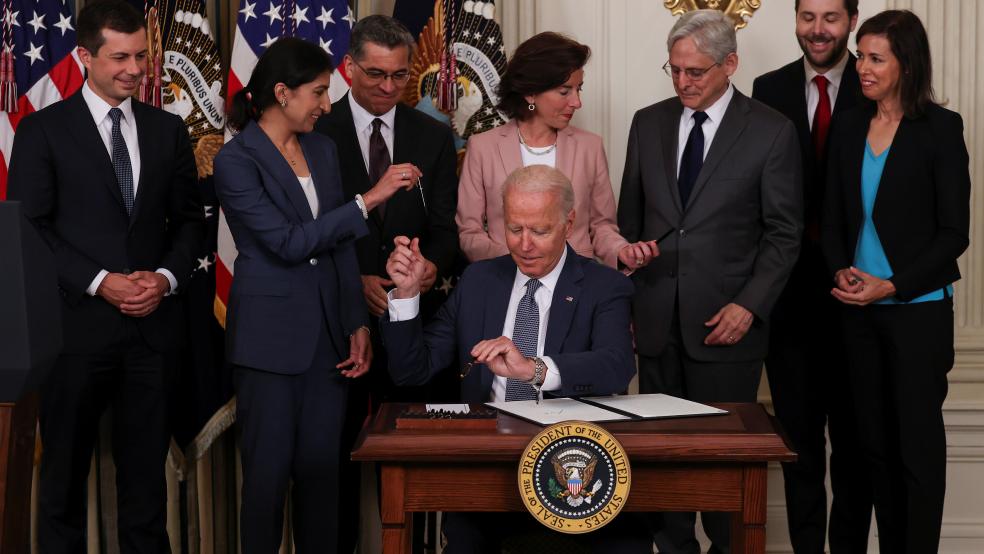President Joe Biden on Friday signed a sweeping executive order that aims to foster competition and limit or reverse corporate consolidation, steps that the president says will lower prices, increase wages and build a healthier economy for consumers, workers, farmers, and small businesses.
“What we’ve seen over the past few decades is less competition and more concentration that holds our economy back. We see it in big agriculture and big tech and big pharma and the list goes on,” Biden said before signing the executive order at the White House. He added: "Let me be very clear: Capitalism without competition isn't capitalism. It's exploitation."
Biden’s executive order encompasses 72 initiatives across more than a dozen federal agencies, according to the White House, with potentially major implications for key sectors of the economy, ranging from technology to financial services to agriculture.
We’ll focus here on health care, an area where the White House says a lack of competition increases prices and reduces access to quality care. “Just a handful of companies control the market for many vital medicines, giving them leverage over everyone else to charge whatever they want,” Biden said. “As a result, Americans pay two and a half times more for prescription drugs than in any other leading country and nearly one in four Americans struggles to afford their medication.
Biden’s order:
* Directs the Food and Drug Administration to work with states on importing drugs from Canada;
* Directs the Department of Health and Human Services to issue a plan to combat high drug prices and price gouging within 45 days;
* Directs HHS to boost support for generic and biosimilar drugs;
* Pushes the Federal Trade Commission to ban so-called “pay for delay” agreements, in which the makers of brand-name drugs pay generic manufacturers to stay out of the market;
* And calls for new rules within 120 days allowing hearing aids to be sold over the counter.
The executive order also takes aim at hospital and insurance industry consolidation, trends that the White House says have left patients, especially those is rural areas, with fewer choices and higher prices. “Thanks to unchecked mergers, the ten largest healthcare systems now control a quarter of the market,” the White House said in a document detailing the executive orders. “Research shows that hospitals in consolidated markets charge far higher prices than hospitals in markets with several competitors.”
Biden’s order encourages the Justice Department and FTC to revise their guidelines to ensure patients are not harmed by hospital mergers and directs HHS to address hospital billing and “support existing hospital price transparency rules.” It also directs HHS to standardize plan options on the Obamacare exchanges to make it easier for people to comparison shop.
Business groups say Biden is off base: Business groups criticized Biden’s order — and the premise behind it. “Today’s executive order is built on the flawed belief that our economy is over-concentrated, stagnant and fails to generate private investment needed to spur innovation,” said Neil Bradley, executive vice president of the U.S. Chamber of Commerce. “Such broadsided claims are out of touch with reality, as our economy has proven to be resilient and remains the envy of the world.” Hospital and drug industry trade groups also pushed back, warning that Biden’s order could slow critical care and claiming that the U.S. already has “the world’s most competitive market for prescription medicines.”
The reality ahead: These presidential orders have a long way to go before they become federal rules and regulations. The process could take months, and there are likely to be additional hurdles ahead. “The eventual rules and regulations that follow from the White House’s direction are likely to set up heated battles with top U.S. companies that could take years to resolve,” The Wall Street Journal notes.
The Trump administration, for example, issued rules for states to apply to import drugs, but no imports have begun. “Several states, including Florida, have expressed interest in importing drugs as a way to lower costs,” CNN notes. “But Canada has opposed the idea, and experts question whether the country has enough of a supply to make a significant dent in US drug prices. Manufacturers have also filed a lawsuit to stop the effort.”
The bottom line: Biden’s order is the most ambitious effort in decades to counter monopolies and the concentration of market power, a key theme that has emerged among Democrats in recent years. “The move marks a sea change from four decades of a hands-off-big-business approach ushered in by Ronald Reagan,” Axios’s Margaret Harding McGill notes.
Biden himself made that shift explicit. “We are now 40 years into the experiment of letting giant corporations accumulate more and more power,” he said. “And what have we gotten from it? Less growth, weakened investment, fewer small businesses. … I believe the experiment failed.”





